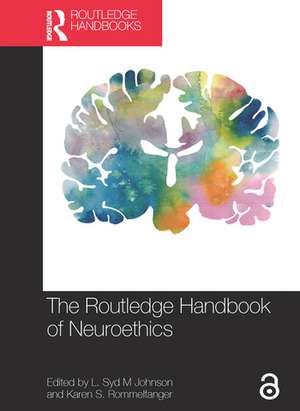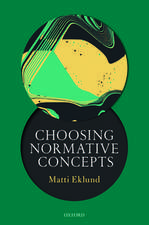The Routledge Handbook of Neuroethics: Routledge Handbooks in Applied Ethics
Editat de L. Syd M Johnson, Karen S. Rommelfangeren Limba Engleză Paperback – 30 iun 2020
Chapter 11 of this book is freely available as a downloadable Open Access PDF under a Creative Commons Attribution-Non Commercial-No Derivatives 3.0 license. https://www.routledgehandbooks.com/doi/10.4324/9781315708652.ch11
| Toate formatele și edițiile | Preț | Express |
|---|---|---|
| Paperback (1) | 454.43 lei 6-8 săpt. | |
| Taylor & Francis – 30 iun 2020 | 454.43 lei 6-8 săpt. | |
| Hardback (1) | 1220.37 lei 6-8 săpt. | |
| Taylor & Francis – 12 iul 2017 | 1220.37 lei 6-8 săpt. |
Preț: 454.43 lei
Nou
Puncte Express: 682
Preț estimativ în valută:
86.97€ • 90.56$ • 73.50£
86.97€ • 90.56$ • 73.50£
Carte tipărită la comandă
Livrare economică 10-24 martie
Preluare comenzi: 021 569.72.76
Specificații
ISBN-13: 9780367573379
ISBN-10: 0367573377
Pagini: 530
Dimensiuni: 174 x 246 x 33 mm
Greutate: 0.88 kg
Ediția:1
Editura: Taylor & Francis
Colecția Routledge
Seria Routledge Handbooks in Applied Ethics
Locul publicării:Oxford, United Kingdom
ISBN-10: 0367573377
Pagini: 530
Dimensiuni: 174 x 246 x 33 mm
Greutate: 0.88 kg
Ediția:1
Editura: Taylor & Francis
Colecția Routledge
Seria Routledge Handbooks in Applied Ethics
Locul publicării:Oxford, United Kingdom
Notă biografică
L. Syd M Johnson is Associate Professor of Philosophy and Bioethics in the departments of Humanities and Kinesiology and Integrative Physiology at Michigan Technological University. Her current research focuses on ethical and epistemological issues in disorders of consciousness and sport-related neurotrauma.
Karen S. Rommelfanger is an Assistant Professor in the departments of Neurology and Psychiatry and Behavioral Sciences, the Neuroethics Program Director at Emory University’s Center for Ethics, and Neuroscience Editor-in-Residence at the American Journal of Bioethics Neuroscience. A neuroscientist and ethicist, her current research explores how evolving neuroscience and neurotechnologies challenge societal definitions of disease and medicine. She is a member of the Neuroethics Division of the NIH BRAIN Initiative.
Karen S. Rommelfanger is an Assistant Professor in the departments of Neurology and Psychiatry and Behavioral Sciences, the Neuroethics Program Director at Emory University’s Center for Ethics, and Neuroscience Editor-in-Residence at the American Journal of Bioethics Neuroscience. A neuroscientist and ethicist, her current research explores how evolving neuroscience and neurotechnologies challenge societal definitions of disease and medicine. She is a member of the Neuroethics Division of the NIH BRAIN Initiative.
Recenzii
"The Routledge Handbook of Neuroethics is an impressive and important companion to the emerging discipline of neuroethics. The scope of the contributions to this handbook is dazzling, covering not merely well worked questions in neuroethics, but also giving us glimpses of its bright future. A judicious mix of big names and newer voices make this a volume that anyone with an interest in neuroethics will want to read."
--Neil Levy, Macquarie University and University of Oxford
"In this valuable and interdisciplinary collection, Johnson and Rommelfanger have compiled the most interesting and important writings in the emerging field of neuroethics. It explores both "the ethics of neuroscience," that is, ethical issues raised by neuroscience, and "the neuroscience of ethics," that is, the implications of neuroscience for metaethics and moral psychology. This Handbook is a must-read for anyone who wants to understand neuroethics and its potential implications for law and policy."
--Bonnie Steinbock, The University of Albany, SUNY
"In this valuable and interdisciplinary collection, Johnson and Rommelfanger have compiled the most interesting and important writings in the emerging field of neuroethics. It explores both "the ethics of neuroscience," that is, ethical issues raised by neuroscience, and "the neuroscience of ethics," that is, the implications of neuroscience for metaethics and moral psychology. This Handbook is a must-read for anyone who wants to understand neuroethics and its potential implications for law and policy."
--Bonnie Steinbock, The University of Albany, SUNY
Descriere
This Handbook offers an informed view of how the brain sciences are being used to approach and understand traditional philosophical questions in ethics, and how those questions are being revisited beyond the clinical and research domains.
Cuprins
Contents
List of Contributors
Introduction
Part I. What is Neuroethics?
Index
List of Contributors
Introduction
Part I. What is Neuroethics?
- The Competing Identities of Neuroethics: Remarks on Theoretical and Methodological Assumptions and Their Practical Implications for the Future of NeuroethicsEric Racine and Matthew Sample
- Neuroethics and the Neuroscientific TurnJon Leefmann and Elisabeth Hildt
Part II. The Ethics of Neuroscience - Thinking Differently: Neurodiversity and Neural EngineeringSara Goering
- The Ethics of Expanding Applications of Deep Brain StimulationMarkus Christen and Sabine Müller
4.1 Spotlight: Neuromodulation
4.2 Spotlight: Ablation Techniques
Markus Christen and Sabine Müller - The Ethics of Prodromal and Preclinical Disease StagesJalayne J. Arias, Jennifer Sarrett, Rosa Gonzalez, Elaine F. Walker
- Disorders of Consciousness and the Use of Neurotechnologies: An Ethical PerspectiveOrsolya Friedrich and Ralf J. Jox
- Placebo for Psychogenic Disorders: Ethics, Illness, and Treatment NarrativesLindsey Grubbs and Karen S. Rommelfanger
- Cosmetic Neurology and the Ethics of EnhancementAnjan Chatterjee
- Modafinil and the Increasing Lifestyle Use of Smart Drugs by Healthy People: Neuroethical and Societal IssuesSebastian Porsdam Mann and Barbara J. Sahakian
- Neuroenhancement and Therapy in National Defense ContextsMichael N. Tennison and Jonathan D. Moreno
- Moral NeuroenhancementBrian D. Earp, Thomas Douglas, and Julian Savulescu
- My Brain Made Me Do It?: Neuroscience and Criminal ResponsibilityValerie Gray Hardcastle
- Your Brain on Lies: Deception Detection in CourtJulie A. Seaman
13.1 Spotlight: Lie Detection Technologies
Valerie Gray Hardcastle - Neuroprivacy and Cognitive LibertyPaul Root Wolpe
- Chronic Traumatic Encephalopathy: Ethical, Legal, and Social ImplicationsL. Syd M Johnson
- Neurohype: A Field Guide to Exaggerated Brain-Based ClaimsScott O. Lilienfeld, Elizabeth Aslinger, Julia Marshall, and Sally Satel
- Neuroscience Online: Real Ethical Issues in Virtual RealmsRyan H. Purcell and Karen S. Rommelfanger
- Home Use of tDCS: From "Do-It-Yourself" to "Direct-To-Consumer"Anna Wexler and Peter B. Reiner
Part III. The Neuroscience of Ethics - Moral ReasoningJohn D. Banja
- Informing Ethical Decision MakingAdam Feltz and Edward T. Cokely
- Brain Implants: Implications for Free WillWalter Glannon
21.1 Spotlight: Free Will
Walter Glannon - Personal Identity and Brain IdentityGeorg Northoff and Nils-Frederic Wagner
22.1 Spotlight: Mind-Body Identity: Are We Just Our Brains?
Kimberly Van Orman - Values, Empathy, and the BrainNina L. Powell and Stuart W.G. Derbyshire
- Moral RobotsMatthias Scheutz and Bertram F. Malle
24.1 Spotlight: Artificial Intelligence, Consciousness, and Moral Status
Susan Schneider
Part IV. Expanding the Frame - Neurogenderings and NeuroethicsCyd Cipolla and Kristina Gupta
- Neurodiversity, Neuroethics, and the Autism SpectrumEmily Y. Liu
- RDoC’s Special Kind of Reductionism and its Possible Impact on Clinical PsychiatryLuc Faucher and Simon Goyer
- Neuroethics in Context: The Development of the Discipline in ArgentinaArleen Salles
- Neuroethics in JapanTamami Fukushi, Taichi Isobe, Eisuke Nakazawa, Yoshiyuki Takimoto, Akira Akabayashi, Laura Specker Sullivan and Osamu Sakura
- The Neurobiologic Embedding of Childhood Socioeconomic StatusMargaret A. Sheridan
- Prenatal and Neonatal Neuroethics: The Moral Significance of PainienceL. Syd M Johnson
- Animal Minds: The Neuroethics of Nonhuman Dissent
Index








































